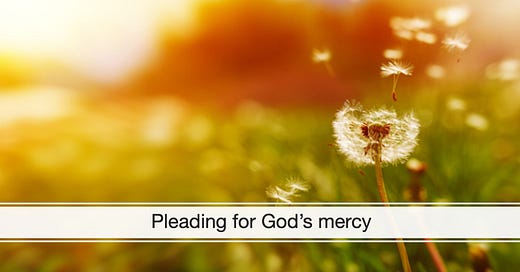Psalm 90:3-5a, 12-13, 14 and 17
Psalm 90 is the only psalm in the entire Psalter associated with Moses, and its main theme is the brevity of human life. The psalmist links our fleeting life and its troubles with God’s anger and punishment for our sins (see Ps 90:7). We find here the echo of Genesis 3:19 where God pronounced the verdict over Adam: “By the sweat of your face you shall eat bread, till you return to the ground, for out of it you were taken; for you are dust, and to dust you shall return”.
This pessimistic view of life filled with afflictions coming from the Lord leads to a petition for God’s mercy. In exchange for the years of misfortune, the psalmist asks the Lord to give his people years of joy and prosperity. The petition for mercy begins with the phrase that we have already discussed during our podcast: “How long?” (Ps 90:13). As the Lord at the beginning of the psalm called human beings to “return”, so now the psalmist calls the Lord to “return”.
It is worth noting that the word “return” in the Scripture is sometimes used for repentance. The scholars also indicate that verse 3, which reads in our liturgical translation, “You turn man back to dust”, could also be rendered as “You return man to contrition”. The Hebrew word “dust” can also mean “brokenhearted” (see Ps 34:18; Is 57:15). We have no problem with relating the word repentance to human beings, but how about linking this word with God?
The basic meaning of the word “repentance” is “to change our mind”. But, can God change his mind? Theologians will find it unacceptable. But, things are not so straightforward. The book of Jonah puts this interesting statement in the mouth of the king of Nineveh: ”Who knows? God may turn and relent and turn from his fierce anger so that we may not perish.” (Jonah 3:9). And that is what happened: “God relented of the disaster that he had said he would do to them, and he did not do it” (Jonah 3:10).
At the heart of the message of the Bible is God’s “hesed” - His steadfast love. The psalmist prays to experience this love: “Satisfy us at daybreak with Your steadfast love” (Ps 90:14). Morning is a beautiful time of the day. The sun rises, we get up refreshed after a good sleep, and with renewed energy, face the day. But the morning also points to Easter, the day that proclaims the victory of everlasting life over death. Easter morning is the final answer to the psalmist's request for God’s mercy.




